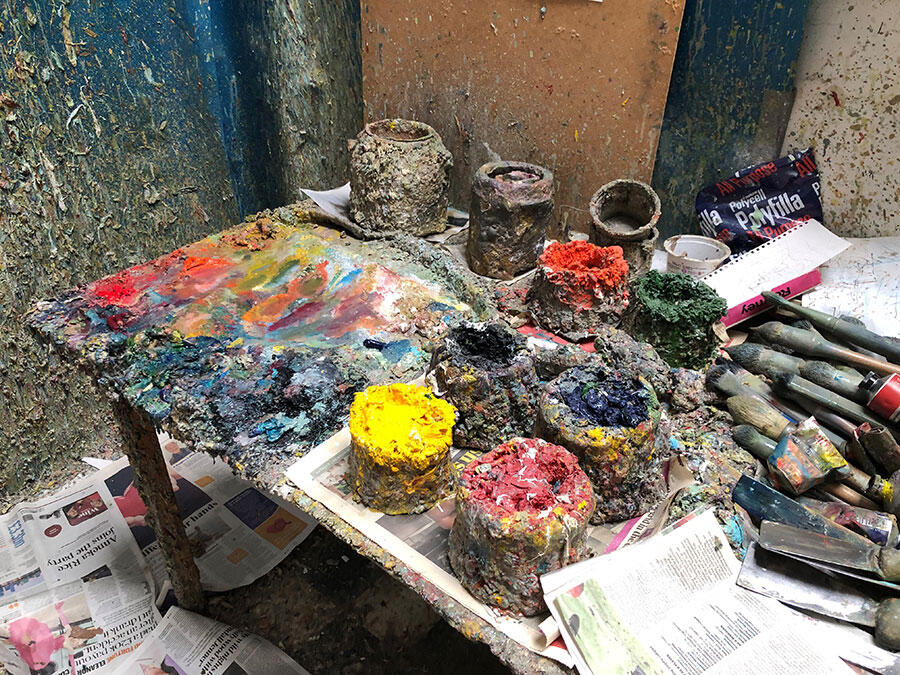German-British Painter Frank Auerbach Has Died Aged 93
The artist, who captured the beauty and anguish of the human experience, leaves behind a body of work that will resonate for generations to come
The artist, who captured the beauty and anguish of the human experience, leaves behind a body of work that will resonate for generations to come

Frank Auerbach, the German-British painter whose expressionistic portraits captured the beauty and anguish of the human experience, has died aged 93. In an email announcing the news, Geoffrey Parton, director of Frankie Rossi Art Projects said, ‘We have lost a dear friend and remarkable artist but take comfort knowing his voice will resonate for generations to come.’
Born in Berlin in 1931, Auerbach arrived in England in 1939 as a refugee of the Nazi regime. He was one of six children sponsored by English writer Iris Origo – a friend of the artist’s parents. He became a naturalized British citizen in 1947.

From 1948 to 1955, Auerbach studied at St. Martin’s School of Art and at the Royal College of Art in London, the city where he lived and worked for most of his life. A presentation of his paintings by Frankie Rossi Art Projects at Frieze Masters in 2024 highlighted the importance of a stable place for this artist who began life in so much tumult. The works, dating from the early 1970s to 2021, were vibrant and colourful reminders of the extraordinary diversity of an artist best known for his deeply psychological portraits, especially of repeat sitters.
‘It’s possibly true that our deepest experiences are other people,’ he told the Guardian in 2023. ‘I do think subject matters. And it seems that the only thing worth using for one’s art is one’s deepest experiences.’ He added that drawing and painting helped him understand his relationship to people, including his companions and friends. Auerbach was also painted by his artist friends, most notably, Francis Bacon and Lucian Freud created portraits of the artist in 1964 and 1974–75, respectively.
After mounting a string of solo exhibitions at the Beaux Arts Gallery in London and the Marlborough Gallery beginning in the 1950s and ’60s, Auerbach’s first retrospective opened at the Hayward Gallery in 1978. It was a major success. William Packer, writing for the Financial Times, called it ‘a dense, weighty and ultimately triumphant demonstration of painting at its most concentrated and profound. No one can claim to be seriously interested in the art of our own time and yet not know it is on, and wish to see it.’

The dense and clumpy surfaces of Auerbach’s works often fail to translate in photographs. ‘Viscid, murky, closely held, these paintings are definitely not the sort you love at first sight,’ Jason Farago wrote for The New York Times in 2021, on occasion of the artist’s exhibition at Luhring Augstine, New York, ‘but they are so rewarding to fathom in person.’
Admired by peers in the UK, Auerbach’s international reputation grew over the years, with major exhibitions dedicated to the artist at the Yale Center for British Art in New Haven, Connecticut; the Van Gogh Museum in Amsterdam; and the Centro de Arte Reina Sofia in Madrid; among others. He represented the UK in the Venice Biennale in 1986, where he shared the Golden Lion with Sigmar Polke. In 2015, Tate Britain and the Kunstmuseum Bonn mounted a joint retrospective of the artist’s work.

During his life, a certain mystique developed around the artist, who was reported to work every day in his studio, nonstop, and rarely participated in art world socializing. ‘He’s all by himself, every evening, by choice,’ curator and art historian Catherine Lampert said. It was enough to attract the celebrated novelist W.G. Sebald, whose Emigrants from 1992 includes a thinly disguised portrait of the artist. Sebald describes how Auerbach (called Max Ferber) applies paint, then scratches it off to create portraits of ‘great vividness’, which also risk breakdown and annihilation.
This possibility of destruction, of failure – that everything might fall apart – drove the artist to work constantly. ‘I repaint pictures again and again and again,’ he told Prospect magazine in 2012. ‘I think there’s an underlying secret structure to things and I’m trying to get to it, I’m trying to burrow towards it.’






















